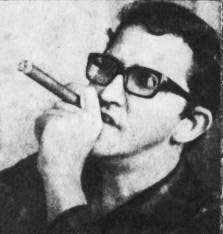 (finally posted)
(finally posted)In 1971, poet Heberto Padilla (1932-2000, at right) became an international cause celèbre after Fidel Castro's regime imprisoned him and released him only after forcing him to publicly confess that he was active in counterrevolutionary activities. In the process, he denounced his wife, Belkis Cuza Malé (1942-), also a notable writer now living in Texas, though they reconciled. What sparked this was Padilla's having won Cuba's top literary prize, the Premio Julian de Casal, for a collection of poems, Fuera del Juego (Out of the Game), that openly critiqued Cuba's ever tightening post-Revolutionary political restraints and its emphasis on pro-government, social realist art. His imprisonment and forced self-denunciation, which followed the imprisonment, harassment or shunning of a number of prominent socially or politically dissident figures in the arts, provoked 60 highly regarded international writers and culture workers, including strong supporters of the Cuban Revolution, to protest to Castro. The incident also overshadowed Padilla's poetry, which constitutes a substantial--and in the eyes of some critics, the most important--opus in contemporary Cuban poetry. By the time he immigrated to the US, in 1980, he had completely fallen out of favor with the Castro regime, but was widely acclaimed overseas; by the time he died of natural causes in Auburn, Alabama in 2000, he was little mourned back home and merited little commentary among non-Spanish-speaking literary communities. Beside the man as political icon, symbol, tool, as I said, there is the poetry, a great deal of it, and it's very good. So let's read some. Here's one of Padilla's poems that keeps ringing in my head like a chime, from the collection Legacies: Selected Poems (FSG, 1980).
EN LUGAR DEL AMOR
Siempre, más allá de tus hombros veo al mundo.
Chispea bajo los temporales.
Es un pedrazo de madera podrida, un farol viejo
que alguien menea como a contracorriente.
El mundo que nuestros cuerpos
(que nuestra soledad) no pueden abolir,
un siglo de zapadores y hombres ranas
debajo de tu almohada,
en el lugar en que tus hombros
se hacen más tibios y más frágiles.
Siempre, mas allá de tus hombros
(es algo que ya nunca podremos evitar)
hay una lista de desaparecidos,
hay una aldea destruida,
hay un niño que tiembla.
IN LOVE'S PLACE
Always, over your shoulder, I see the world.
It gives off sparks in storms.
It is a piece of rotten wood, an old lantern
that someone waves as though against the wind,
the world that our bodies
(our solitude) cannot blot out,
an age of sappers and frogmen
under your pillow,
in the place where your shoulders
turn cooler, more fragile.
Always, over your shoulder
(something that now we can never avoid),
there is a list of missing persons,
a village destroyed,
a child trembling.
Translated by Alaistair Reid and Andrew Hurley
Copyright © 1980, Heberto Padilla, from Legacies: Selected Poems, New York: Farrar Straus Giroux. All rights reserved.









No comments:
Post a Comment